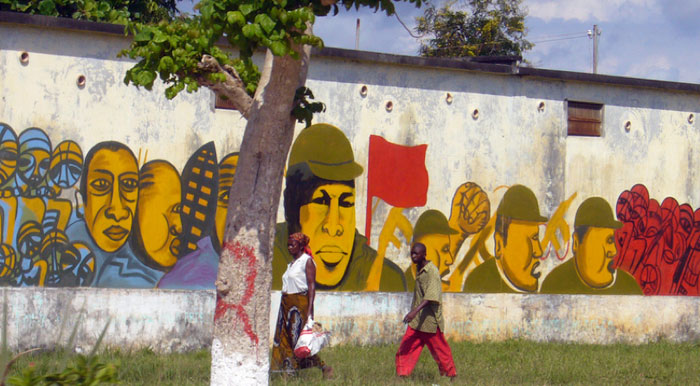
A mural in Mozambique depicts the civil war.
Mozambicans’ focus on local ownership, aided by the Community of Sant’Egidio’s facilitation efforts, transformed Mozambique from a country ravaged by civil war into a possible model for sustainable peace. This was the main reflection of an IPI roundtable discussion on October 23rd, which was co-organized with George Mason University.
![]() Download this as a meeting brief
Download this as a meeting brief
Meeting participants, some of whom had been actively engaged in the peace process, reflected on four key themes:
- Local ownership was essential for lasting peace. The changing world of the early 1990s had a significant impact on Mozambique’s 16-year civil war. With the end of the apartheid regime in South Africa, the Mozambican National Resistance (RENAMO) lost a key external sponsor; with the collapse of the Soviet Union, so did the ruling Front for the Liberation of Mozambique (FRELIMO). A peace process became possible when Mozambican leaders acknowledged that they needed to shift from one-party rule to multiparty rule. Over time, this realization allowed the parties to engage in building a national consensus. The focus of political discourse has gradually shifted from the allegiances that fueled the civil war to addressing national needs.
- Mozambique may offer a mediation model. External conditions were ripe for a peace agreement in Mozambique: Security Council alignment, foreign aid, and the end of the Cold War played an important role. But with local actors ready to find their own solution, Sant’Egidio and other external actors played a valuable role in getting them to the table time and again, and facilitating an agreement amenable to both. Not only did the religious association provide a location for the Rome General Peace Accords, it also fostered an atmosphere that encouraged parties to internalize the agreement so that it could be sustained over time.
- Peace took precedence over accountability. Mozambique stands out as a case where the parties chose to forgo accountability for the sake of peace. In a time before South Africa’s Truth and Reconciliation Commission and the ad hoc tribunals for Rwanda and the former Yugoslavia, the decision to provide amnesty to fighters on both sides was supported by the UN, the US, and other interested parties—and was considered necessary to seal the agreement. Nonetheless, informal and traditional forms of reconciliation have since occurred at local levels.
- Growth, poverty, and inequality present challenges. Although Mozambican schoolchildren today have shoes on their feet and books in their backpacks, poverty remains high and foreign investment may be exacerbating inequality. Leaders should ensure that large-scale investments reach local communities and continue building a political culture where institutions will safeguard rights for all.







